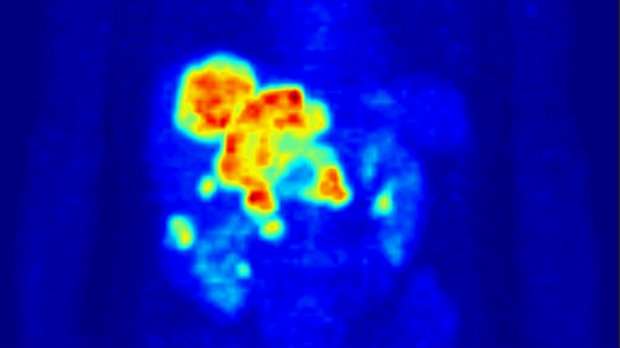Radioactive particles combined with chemotherapy slow advanced bowel cancer growth in the liver

A new cancer treatment which injects tiny radioactive 'microspheres' into the liver can slow the growth of tumours that have spread there, according to new research.
The microspheres are about a third of the width of a human hair and contain the radioactive element yttrium-90. They are delivered directly to the liver via the blood stream.
The particles then become lodged in the small blood vessels surrounding the tumour and bombard it with radiation, while having minimal impact on the surrounding healthy tissue.
The findings were presented at the American Society of Clinical Oncology (ASCO) annual conference in Chicago and showed that combining microspheres with chemotherapy in patients with bowel cancer that had spread to the liver slowed the growth of their liver tumours for almost eight months longer than chemotherapy alone.
But the study didn't yield enough data to say for certain whether patients lived longer overall.
Henry Scowcroft, Cancer Research UK's senior science communications manager, said: "These are encouraging initial results which need longer follow-up. They suggest that - for patients whose bowel cancer has spread to the liver - injecting the liver with radioactive particles is more effective at temporarily stopping tumour growth than giving chemotherapy alone."
The study included 530 people and found that in six per cent of cases the combined therapy sent the cancer into remission - three times more frequently than when only chemotherapy was used.
"This is important because conventional radiotherapy can't be used on the liver. So there's an urgent need to find new, more effective ways to treat patients with advanced bowel cancer which has spread," he added.
Each year around 41,600 people in the UK are diagnosed with bowel cancer (also called colorectal cancer), and 16,200 die from the disease. In about 60 - to 70 per cent of cases, the cancer spreads (metastasises) to the liver.
Prof Gibbs, co-principal investigator and consultant medical oncologist at The Royal Melbourne Hospital in Australia, said: "This finding matters a great deal because the liver is almost invariably the organ where colorectal cancer spreads to first.
"While half the patients initially diagnosed with colorectal cancer survive thanks to surgical removal of the primary tumour before the disease has spread elsewhere in the body, liver metastases eventually cause the death of the majority of the remaining patients each year whose tumours spread but are inoperable."
"We eagerly look forward to seeing these results combined with those of other similar international trials - one of which is being run by Cancer Research UK - to see whether survival can be improved for these patients overall," added Scowcroft.
The Cancer Research UK-funded FOXFIRE trial, also looking at yttrium particles for advanced bowel cancer, launched in 2010 and finished recruiting patients in October 2014.
More information: Gibbs, Peter et al. 'SIRFLOX: Randomized Phase III Trial Comparing First-Line Mfolfox6 ± Bevacizumab (Bev) Versus Mfolfox6 + Selective Internal Radiation Therapy (SIRT) ± Bev In Patients (Pts) With Metastatic Colorectal Cancer (Mcrc).'. J Clin Oncol 33, 2015.
















